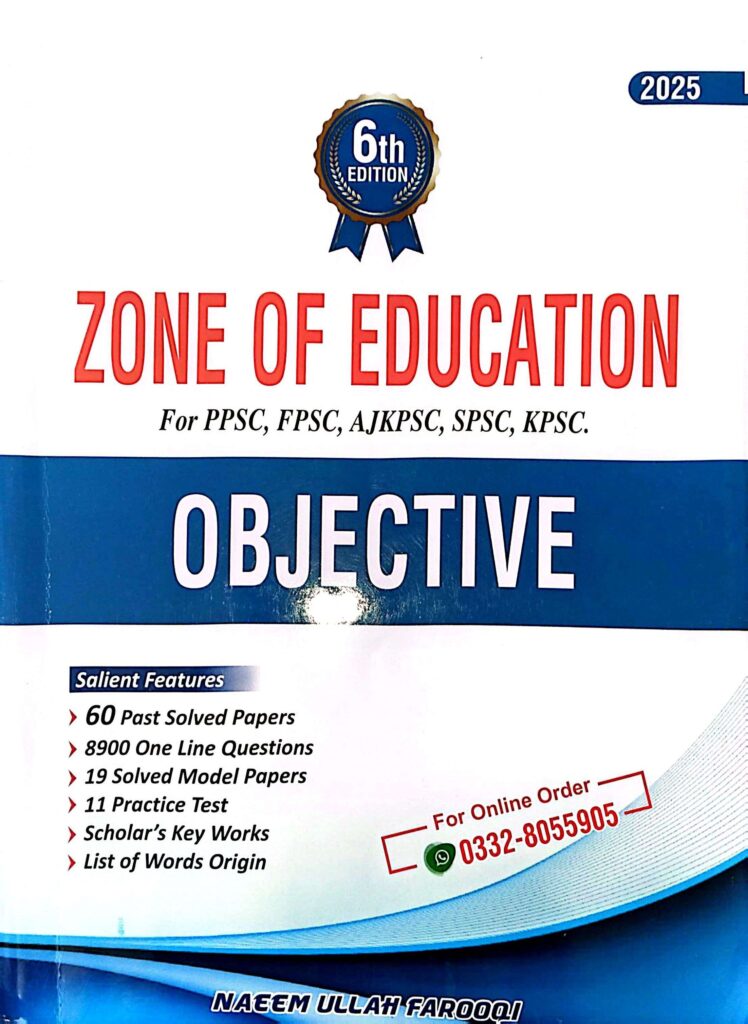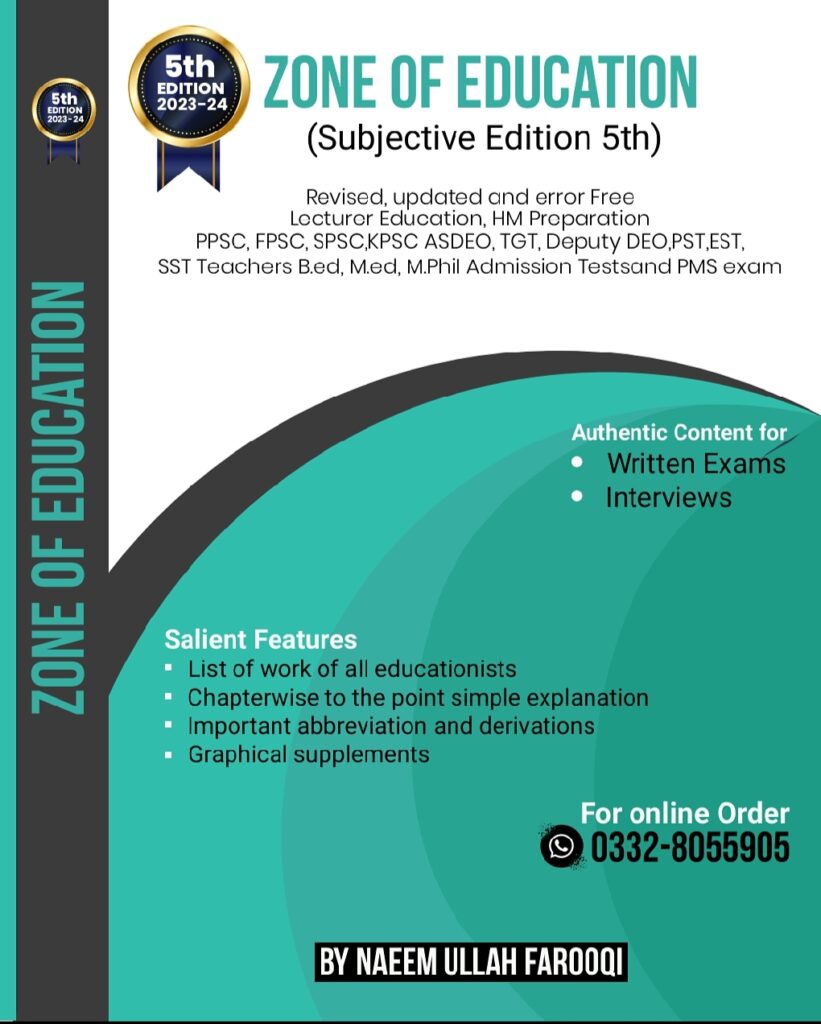PSYCHOLOGY
.1. The ability to solve problems or to adjust in the new environment is the definition of:
o (a) Personality
o (b) Behaviour
o (c) Intelligence
o (d) All of these
2. The founder of Behaviourism is:
o (a) Maslow
o (b) Plato
o (c) Aristotle
o (d) J. B. Watson
3. Concrete Operation occurs at the age of:
o (a) 3-5 years
o (b) 4-6 years
o (c) 7-12 years
o (d) 6-12 years
4. How many groups are usually made in Experimental method:
o (a) 5
o (b) 4
o (c) 3
o (d) 2
5. Child Development study is useful for:
o (a) Teachers
o (b) Parents
o (c) Administrators
o (d) Examiners
6. Independent variable is applied to:
o (a) Experimental Group
o (b) Control Group
o (c) Both a & b
o (d) None of a & b
7. Life of an individual starts from:
o (a) Nucleus
o (b) Zygote
o (c) Cell
o (d) Membrane
8. How many factors affect growth:
o (a) 2
o (b) 3
o (c) 4
o (d) 5
9. Classical conditioning was presented by:
o (a) Ivan, P. Pavlov
o (b) B.F. Skinner
o (c) J.B. Watson
o (d) Dewey
10. The variable whose effect is sought is called:
o (a) Relevant variable
o (b) Dependent variable
o (c) Independent variable
o (d) None of above
11. The variable which is affected by the independent variable is called:
o (a) Relevant variable
o (b) Dependent variable
o (c) Independent variable
o (d) None of above
12. Variables other than the independent variable which can affect the dependent variable are called:
o (a) Relevant variable
o (b) Dependent variable
o (c) Independent variable
o (d) None of above
13. Method in which a keen study of any event or behaviour is made is:
o (a) Observation Method
o (b) Experimental Method
o (c) Development Method
o (d) Psycho-physical Method
14. Study of behaviour under controlled conditions is:
o (a) Observation Method
o (b) Experimental Method
o (c) Development Method
o (d) Psycho-physical Method
15. Growth of children is studied in:
o (a) Observation Method
o (b) Experimental Method
o (c) Development Method
o (d) Psycho-physical Method
16. Sensory disabilities are studied in:
o (a) Observation Method
o (b) Experimental Method
o (c) Development Method
o (d) Psycho-physical Method
17. The period starting from Zygote to 250-300 days is:
o (a) Pre-natal period
o (b) Neonate period
o (c) Adolescence
o (d) Adulthood
18. The period starting from birth to two weeks is:
o (a) Pre-natal period
o (b) Neonate period
o (c) Adolescence
o (d) Adulthood
19. The period starting from 13 years to 19 years is:
o (a) Pre-natal period
o (b) Neonate period
o (c) Adolescence
o (d) Adulthood
20. Which is not a hereditary factor:
o (a) Colour
o (b) Height
o (c) Diet
o (d) Eye colour
21. Which one is an heredity factor:
o (a) Diet
o (b) Water
o (c) Height
o (d) Light
22. Cognitive development deals with:
o (a) Body
o (b) Mind
o (c) Society
o (d) Emotion
23. How many stages of cognitive development are described by Jean Piaget:
o (a) 3
o (b) 4
o (c) 5
o (d) 6
24. The period starting from birth to two years in cognitive development is:
o (a) Sensori-motor stage
o (b) Pre-operational stage
o (c) Concrete operational stage
o (d) Formal operational stage
25. The period starting from 2-7 years in cognitive development is:
o (a) Sensori-motor stage
o (b) Pre-operational stage
o (c) Concrete operational stage
o (d) Formal operational stage
26. The period starting from 7-12 years in cognitive development is:
o (a) Sensori-motor stage
o (b) Pre-operational stage
o (c) Concrete operational stage
o (d) Formal operational stage
27. The period starting from 12 years onwards in cognitive development is:
o (a) Sensori-motor stage
o (b) Pre-operational stage
o (c) Concrete operational stage
o (d) Formal operational stage
28. Child forgets the things out of sight in:
· (a) Sensori motor stage
· (b) Pre-operational stage
· (c) Concrete operational stage
· (d) Formal operational stage
29. Child describes himself unsystematically in:
· (a) Sensori motor stage
· (b) Pre-operational stage
· (c) Concrete operational stage
· (d) Formal operational stage
30. Child thinks logically in:
· (a) Sensori motor stage
· (b) Pre-operational stage
· (c) Concrete operational stage
· (d) Formal operational stage
31. Whose role is important in moral development:
· (a) Parents
· (b) Teachers
· (c) Peers
· (d) All above
32. Emotional development is affected by:
· (a) Fear
· (b) Quarreling parents
· (c) Restrictions
· (d) All above
33. Permanent change in behavior as a result of experience is:
· (a) Learning
· (b) Education
· (c) Experiment
· (d) Innovation
JOIN ZONE OF EDUCATIONPK!
Discover the most comprehensive and reliable pedagogy resources in Pakistan, curated for competitive exam success. Our content covers all competitive exam MCQs, including PPSC, FPSC, AJKPSC, SPSC, and more. Designed to empower learners with top-notch material and insights, trust us for your preparation journey!



